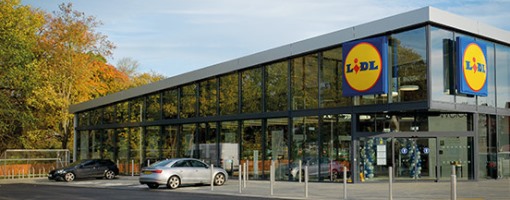Lidl is to roll out a traffic light labelling system for sustainability across its 105 Scottish stores.
In October, the budget supermarket will apply Eco-Score labelling to over 50 of its own-label products including teas, coffees and hot chocolate.
Eco-Score uses open-source data to independently grade products on their sustainability credentials and assigns a colour code ranging from green ‘A’ (low impact) to red ‘E’ (high impact). The new labelling system aims to give shoppers a better understanding of the environmental consequences of products.
To grade a product, Eco-Score independently assesses various factors including production methods, impact on biodiversity, packaging and carbon footprint.
Products also receive better scores where they are certified to third party schemes such as Fairtrade and Rainforest Alliance and Lidl plans to use the scheme to promote its commitment to sourcing 100 per cent of its key raw materials, such as tea, coffee and cocoa from certified sustainable sources.
“Rolling out the Eco-Score trial in Scotland is a huge milestone for Lidl, one we’re extremely proud of,” said Amali Bunter, head of responsible sourcing and ethical trade at Lidl. “We know that shoppers want more support in understanding the environmental impact of the products they buy day-to-day and Eco-Score will do just that.”
Bunter added: “The trial will help customers in our 105 Scottish stores road test the new traffic light system and ultimately make greener shopping choices in the process.”
Over the course of the trial, Lidl will take feedback from its customers on the new labelling system before deciding how to progress with the scheme. The company will also share the findings from its pilot.
Latest News
-
Tesco makes ‘significant strides’ on safety through body worn cameras
-
Flying Tiger Copenhagen appoints new group chief executive
-
Walgreens cuts over 600 jobs after buyout
-
Mango opens first store in Limerick as part of expansion plan
-
eBay and Etsy to buy Depop for $1.2bn
-
REWE opens automated fresh food facility to serve Berlin outlets
Beyond Channels: Redefining retail with Unified Commerce
This Retail Systems fireside chat with Nikki Baird, Vice President, Strategy & Product at Aptos will explore how unified commerce strategies enable retailers to tear down these barriers and unlock new levels of operational agility and customer satisfaction.
The future of self-checkout: Building a system that works for consumers and retailers
In this webinar, industry leaders discussed what the future of self-checkout looks like and how retailers can make the technology work for everyone.
© 2024 Perspective Publishing Privacy & Cookies









Recent Stories